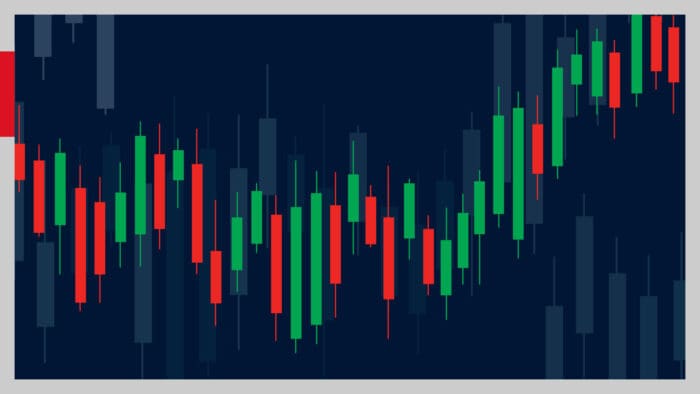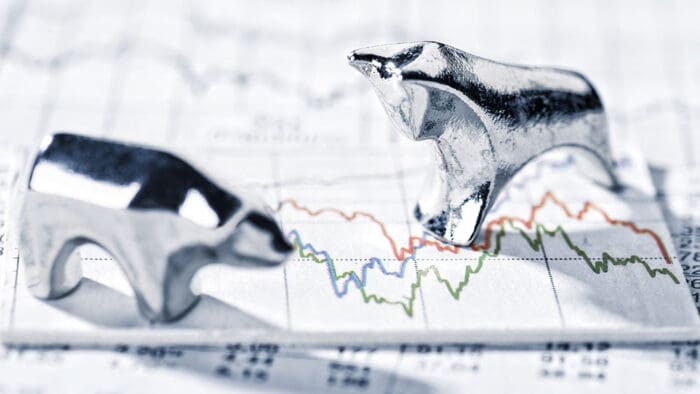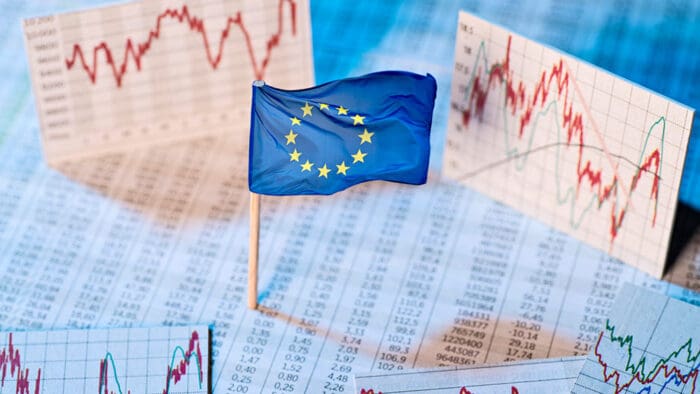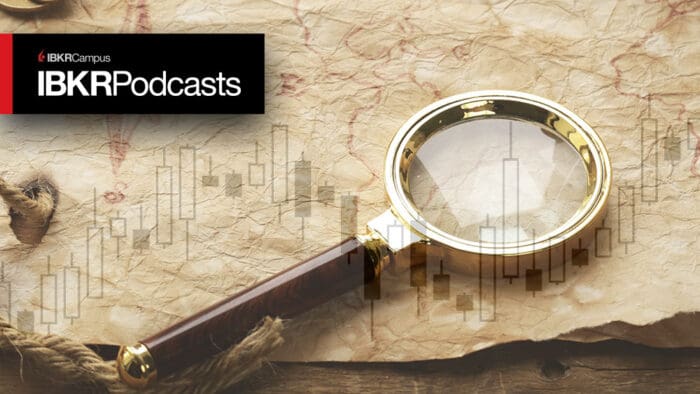Contact Information:
https://www.linkedin.com/in/stefanograsso/
Chart of the Month – Newsletter sign-up
Summary – IBKR Podcasts Ep. 115
The following is a summary of a live audio recording and may contain errors in spelling or grammar. Although IBKR has edited for clarity no material changes have been made.
Guillaume Roux Chabert
Welcome to this new IBKR Podcast, this is Guillaume Roux Chabert from Interactive Brokers Singapore. I am joined by Stefano Grasso, portfolio manager for the Enhanced Value Fund in Singapore. How have you been since the last time we did our podcast Stefano?
Stefano Grasso
Hi Guillaume, thanks for having me. I’m good. All good. Thank you. Since last episode, we launched a newsletter. It’s called Chart of the Month. It is a short, chart heavy, text light monthly kind of publication where we share the kind of analysis that we look at on our day-to-day research. We had quite some success. So, the September issue had about 10 charts and the tilt to energy, our kind of bigger exposure in the fund. So, it’s free to register. I encourage to everyone to sign up and I’ll ask the team to put it in the podcast script description to make it easy.
Guillaume Roux Chabert
Thanks. And actually, I have subscribed, so let’s now dive into the topic. So, the other valued market dilemma: Where to find value in an overpriced market. So, first of all, can you tell us how you see the current market valuation, and do you think we are in a bubble right now?
Stefano Grasso
The US market is currently expensive by historical standards. But it is always difficult to predict a short and even medium-term market move for the general investor. The best solution is probably to dollar cost average over time into the market as the tailwind is always there and you know year-over-year the market should do well.
Guillaume Roux Chabert
Right, so let’s be a little bit more specific here, you just mentioned about the US market, and you say overall, so I guess where does a portfolio manager like you look for value in this market?
Stefano Grasso
We are bottom up, stock pickers. So, we tend to look at individual companies. However, to source for ideas and find interesting areas, we look also at the macro level. And if you look at different geography, sector teams and styles, you can clearly find a more heterogeneous picture than the synthetic price earning or whichever metrics you want to use to call the market overvalued. So, for example, within the S&P 500 the top ten stocks account for about 90% of the performance year to date and actually in the last few days 400% of the performance, meaning that the remaining 490 stocks actually have a flat performance. So, there are you know stocks that are around 10/20% and there might be more value there than in some of the highflyers that have been running year to date into 2023.
If you look at developed markets even without going into emerging markets, Europe is definitely cheaper than US. Just to give you an idea, you have things like Norway and then of course Spain, Italy, Greece that are trading below 10 times earnings. Whereby the US market is trading above 21 currently times earnings. So, you can argue that within these areas you can find reasonably priced stocks.
Going into emerging markets, they are typically cheaper than developed markets and even excluding extremes like China, there is a sense of, I mean historically speaking, these are very, very more attractive from a pure valuation person. And then if you look at, you know you cut the market in terms of sectors, you look at industrials, pharma, consumer staples even, are much cheaper than the information technology running at 30 times earnings. So, in general, I would say there are pockets of value and the value style has never been cheaper compared to the growth that has been the long story, especially now with interest rates on the rise, the market should mean revert and correct some of these excesses.
Guillaume Roux Chabert
Thanks Stefano. One thing that you mentioned is about China. I have a lot of requests to know a little bit better about what’s going on and what’s your view on China equity market. A lot of fund managers seems to be very cautious on China at the moment. So, I wonder it isn’t that so maybe a good time to apply Warren Buffet’s quote, to be fearful when others are greedy and to be greedy only when others are fearful. So, would that buy on fear could apply on China sectors at the moment?
Stefano Grasso
I think it would. I mean if I have to answer gun to the head, yes, it is one of those opportunities. The risk here is outside what we usually look at and try to price, so is outside the intrinsic of the companies that we look at. Definitely China has a number of very, very reasonably cheaply priced companies and the problem is the geopolitical angle can really wipe it and if we look at what happened to Russian equities, they’re basically frozen and held in portfolio at, you know nominal value because of the sanctions and everything that happened after the invasion of Ukraine.
So, I think in the mind of the investor, there is this risk being considered. And therefore, they are applying a discount that of course you can understand it’s very volatile because you can say you know it’s 20%, you can say it’s 80%, you can say it’s uninvestable. As someone said, I mean from a economy perspective, China, we see a bit of a narrative that is overdone in a way. But valuation is clearly either once in a lifetime opportunity or are going to be, you know, Russia V2 with a lot of wounds to lick, so to speak.
Guillaume Roux Chabert
I see. I see. So maybe like, uh, to rebound on that and to expand it to another market, maybe after China and due to China, I see a lot of interest in Japan equities at the moment and it seems that Warren Buffett also clearly took some very strong macro wise view by getting large footprint on this market with the top-of-the-line tickers. So, are you invested you two in Japan and what’s your view on Japan equities in general?
Stefano Grasso
We are not in our portfolio. We don’t have specific Japanese exposure. Of course, you know, Japan is a big market and it’s relevant for many of our portfolio companies in one way or another. But it’s one of those markets like you know, even the Singapore market that are kind of developed markets, but valuation historically has been very low, and they’ve been very cheap markets and that has to be with the relatively unfriendly shareholder attitude.
Typically, this company has a lot of cash on their balance sheet. They’re not returning cash to shareholder. And you know I think we participated in a in an event with the Tokyo Stock Exchange where they were describing the number of attempts that they are doing, and seem to be working by the way, to kind of correct that. But I still think that one issue with Japan is Japan is really for Japanese and it’s interesting you mentioned, Warren Buffett example and it’s interesting you mentioned a macro play because although Warren Buffett is a stock picker, I agree with you in this case, he’s more of a macro play. He had a big advantage. I actually did Linkedin post last year about this matter. He managed to take leverage and lock in a very substantial amount of money at close to zero interest rates because of the balance sheet of Berkshire Hathaway. In the last few years, they have been issuing 10/15/20 years bonds at less than or around 1% per annum cost of capital.
Guillaume Roux Chabert
And of course, if you take that position the best edge not to stay exposed to the fluctuation of the currency is to match the liability with an asset. And in this case the assets are this company that incidentally generate majority of the revenue from outside Japan. So, is the edge of an edge, you basically have company priced in Japanese yen that has a very cheap cost of funding this position for Berkshire Hathaway revenue coming from outside US denominated revenues. And very, you know, at the time of investment, they were even much cheaper.
Japan had a good run as the stock market in general and the Japanese trading houses participated into that rally. So, he invested, I think when the dividend yields on aggregate of these five positions, I believe he was like 7% and just the dividend was covering seven times what he was paying as cost of financing that very investment. So, it was a no brainer. Since then, the dividend got increased, the stock price increased, so it’s a difficult to replicate kind of trade that he managed to pull out in size using the balance sheet. I think he really appreciate the company’s management and the stability and the business model. I personally hired a former employee in my previous job as head of trading for any in APAC from one of these companies, and I had to appreciate how the strong culture of this company permeated in the business environment and really benchmark a point of reference for the Japan business life. So, I understand the angle from Buffett, but the financial place, which is brilliant, you know very, very healthy.
Guillaume Roux Chabert
Yeah, it’s kind of a very interesting that you that you mentioned about that because I think people, they, they just read the top line. But if you drill down indeed there is like it’s almost like a carry trade with equities that Warren Buffett did. Is my understanding correct?
Stefano Grasso
Correct. He rarely invests outside the US because he trusts the legal system, he understands how it works. But I think it was too good to miss, given all the pieces coming together with the financing, staying cheap and this company trading at very reasonable valuation. He has been reading these reports of this company for like 50 years. The amount of knowledge that he has, even though he’s outside the US, these are very international company. They have some investments, you know, in joint venture together. They’re very well-known companies outside Japan for the experts. So, you know it was a carry trade that triggered the investment but was a very, very sensible and Buffet style kind of setup.
Guillaume Roux Chabert
Understood. Well, now that we understood why you did not follow up on this Warren Buffet move, could I ask you about what are you doing at the moment then and what are your focus and what do you think we should be cautious about or mindful about?
Stefano Grasso
So, I think from our perspective, you know in Enhanced Value fund we try to build around you know four blocks if you want. Our ideal investment is nothing that we talk about in this podcast so far. So, it has nothing to do with the macro has nothing to do with if the market is expensive or not, it is looking at the individual company. We’re striving to look at, and our preference is to invest all our portfolio into small to mid-size company with strong tailwind, long runways and conservative balance sheets, meaning low debt and not a lot of risks of leverage in the company. So, if you manage to find these, call it gems, and you manage to deploy capital at the right time into this business, basically they should be able to defeat the macro headwind, the currency devaluation, things that can happen.
It’s very difficult and we have currently invested in four of these companies and we are looking to find or get a reasonable price to the other that we have in our watch list. The second opportunity, the second block that we look at are industries or sectors that are at inflection points. So, here maybe the macro hint is appreciated. So, there are like the you know container sector or the semiconductor sector that typically, or energy, which is the biggest sector for us in the fund. They go through cycles and if you manage to get in at the right time of the cycle then you have a few years of enhanced tailwinds that is going to lift the valuation. If we if you think about energy in the sector, energy is trading below 10 times, earnings, it is the cheapest sector currently in the S&P 500 and if it’s cheap, not because valuation has peaked, but it’s cheap because you know prices are low, then you are in a good potentially a good run.
The third thing is you know looking at opportunities as stocks that have been beaten down. So, irrespective again of the macro and of the sector, there are certain situations where there are restructuring and things like that and if you pick up these stocks close to the end of the bleeding where the valuation is unreasonably low, then again, you have a margin of safety and you can ride the to the mean reversion to the normalization of level. And to some extent to the China market that we discussed before, this is something that it can well happen in the next few quarters, few months as a normalization really, there is alpha to be generated in that case.
And lastly, we look at the overall portfolio and we kind of stress test all this position that we have individual to the macro set up. So, if inflation is going to spike, interest rates are going to keep going up or down. How these great, what we think are great investments, how are they going to do in whatever extreme environment, in whatever stormy environment and you know, we look at these with in mind, the Warren Buffett kind of rule of investing, which is never lose money and famously said the second rule is never forget the first rule. So, we really want to make sure that maybe we missed some opportunities. But if the tide goes out, we have a strong portfolio. So, that’s how you know, we look at it and how we can build a portfolio that is resilient.
Guillaume Roux Chabert
Thank you. So, you mentioned the energy sector being the cheapest sector in the S&P at the moment. So, is that a hint on perhaps one of the few examples you’d like to bring this to life, to our audience. Compared to, I don’t know, AI for instance?
Stefano Grasso
Yeah, I mean, I think energy has many, many characteristics that it justified for us the reason to be significantly overweight. You know I chat with our compliance team, and we prefer not to mention specific stocks and I know that also you guys are okay with that. But going a bit into the specifics, we were invested a couple of years ago in the big cap names, the Exxon, the Chevron, they were trading at valuation very, very low like 5-6 times earnings. And you know, we were post COVID already. So, the market had normalized the price of oil was reasonable. And so, it was not justified.
This energy, oil and gas, fossil fuels for the next 5-10 years are going to be, and I say hopefully, meaning if we accelerate the transition that is much needed is where you know we have 5-10 years of significant dependence of fossil fuels that we need for prosperity as humanity. This big cap we’re representing that. Then they appreciated quite a bit during 2022, and we rotated into smaller cap names still in the US, preferably into shale, which is which has a very strong reaction to oil price. So, if the oil prices stay supported, the shale small companies should kind of result. There are a number of companies, many became debt free over the last few quarters, because they paid down debt, so are very more, very much more resilient than they used to be when the previous crash happened. So, it’s an element of the security that we have.
And most recently we are rotating some of these profits into the transportation sector. So, if you look at oil shipping market, we look at it still as energy related and there is basically no supply. The order book of oil tankers is at historical low. You have a fleet that is being used beyond their reasonable age. A lot of vessels are close to scrapping age. And the setup, the demand supply, it’s just very compelling on the back of a strong and increasing oil demand growth for the next five years, six years.
So, we see the energy as a sector where there are more opportunity than money. Literally. Banks don’t want to finance anything that is fossil related. Funds are forced by, you know, the ESG dictate not to invest there, and we feel has gone a bit too far because we don’t have an alternative. So, we are actually cornering the market that needs resources to try and satisfy what is the demand. So, it’s not that this companies are doing that just because they’re evil. There is demand for this product. The goal should be to take the demand, reduce the demand for these polluting products. So, we see there a lot of opportunities that we express in mainly now in small-cap North American place and oil shipping.
Guillaume Roux Chabert
Thank you very much. I know also from our previous podcasts that things like consumer staples and you often say like what is boring is interesting actually. So, would you also like qualify like the consumer stuff also are also as part of this kind of like over beaten sector and it would be like gems over there or you have a different view from what you just described about the energy sector?
Stefano Grasso
I think so. Consumer staples, have been doing not very well recently as a sector because it’s not sexy. It’s not an eye and typically it’s trading at a valuation that is justified by the high margins. And you know, high return on capital that they have. However, the problem that we see with the sector, if you take a company like Procter and Gamble, for example, it’s trading at 25 times earnings, which you know it’s not a crazy valuation for a company like that. But the stress test scenario in case of interest rates going much higher and putting pressure on valuations downwards, you know, I see a world where next year Procter and Gamble can trade at 15 times earnings. So, if that happens, we are a buyer of Procter and Gamble. At this level, we see more compelling risk-reward in other parts of the market that are more resilient in case of these extreme scenarios that I just mentioned happening. So, a lot of great company, not overpriced, probably is going to be doing good, but not a screaming buy or sell. So, we have a mandate from our investors to look for more interesting risk reward than that.
Guillaume Roux Chabert
Right. Well, we come to the end of this podcast. I think there is a lot of information about how to navigate the overpriced market dilemma and where to find value in this overpriced market. Do you have any conclusion or anything you would like to add to final before we close the podcast?
Stefano Grasso
I’m very happy to engage with your audience. Feel free to reach out. Hopefully, we find some common interest with some of the listeners and readers of the podcast and my DM is open and I’m very happy to discuss with like-minded people. So, if any of these short conversations trigger some thoughts, feel free to shoot them over and we’ll pick it up offline.
Guillaume Roux Chabert
Great. Thank you very much indeed. We’re going to put your contact details in the description of the podcast. And also for the audience if you want to reach out to me too. If you want to have another podcast with another title, we’d like to invite again Stefano Grasso as soon as possible and thank you very much. That was it for me. Thanks Stefano. Cheers.
Stefano Grasso
Bye. Thank you.
Disclosure: Interactive Brokers
The analysis in this material is provided for information only and is not and should not be construed as an offer to sell or the solicitation of an offer to buy any security. To the extent that this material discusses general market activity, industry or sector trends or other broad-based economic or political conditions, it should not be construed as research or investment advice. To the extent that it includes references to specific securities, commodities, currencies, or other instruments, those references do not constitute a recommendation by IBKR to buy, sell or hold such investments. This material does not and is not intended to take into account the particular financial conditions, investment objectives or requirements of individual customers. Before acting on this material, you should consider whether it is suitable for your particular circumstances and, as necessary, seek professional advice.
The views and opinions expressed herein are those of the author and do not necessarily reflect the views of Interactive Brokers, its affiliates, or its employees.
















Join The Conversation
If you have a general question, it may already be covered in our FAQs. If you have an account-specific question or concern, please reach out to Client Services.